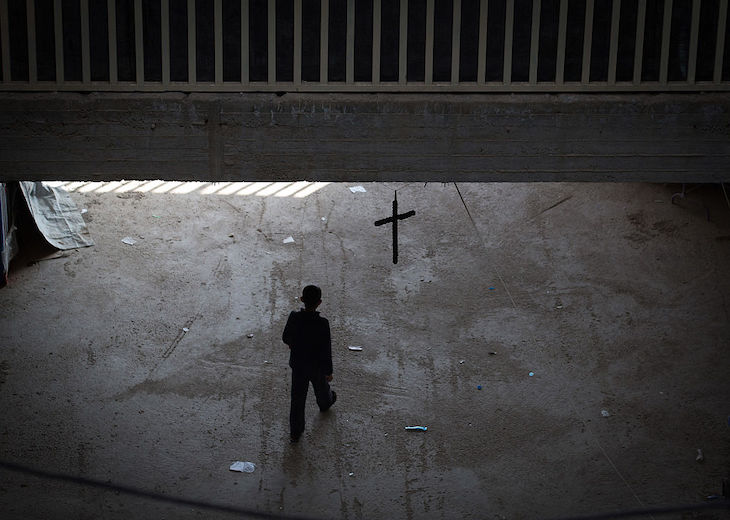While Judaism is proportionately the most persecuted global faith, Christianity is by far the most oppressed numerically. One in seven Christians worldwide – around 300 million people – are under threat, including one in five in Africa. Yet we hear all too little about this rising tide of ‘Christianophobia’.
Christians are still widely assumed to be disproportionately white, western or privileged – and thus somehow less vulnerable to oppression
Christians are even at risk in the West. Over 850 churches and Christian cemeteries were attacked across France in 2021. A Catholic priest, Father Olivier Maire, died tragically in the same year. He was fatally bludgeoned by Emmanuel Abayisenga, on bail awaiting trial for an arson attack on Nantes cathedral. Several months after Maire’s death, Catholics taking part in a procession in Nanterre were denounced in the street as ‘Kafirs’ or infidels by Islamist demonstrators. One mob member cried ‘Wallah [I swear] on the Qur’an I will cut your throat.’ These events came five years after the martyrdom of Father Jacques Hamel, killed by adherents of Islamic State while celebrating Mass at a church in Saint-Étienne-du-Rouvray, Normandy.
In February 2022, the French Interior Ministry promised increased security funding for Catholic churches after a further series of onslaughts, including at Saint-Denis cathedral outside Paris (smashed windows and doors); in Bondy and Romainville, also near the capital (theft and profanation of the tabernacles at churches in both places); in Vitry-sur-Seine (profanation and theft); in Poitiers (statues of saints destroyed); and Paray-le-Monial, north of Lyon (theft of relics). A sense of alarm was not only felt by Catholics. The government’s pledge followed an unprecedented request for security guarantees from the president of France’s Protestant Federation.
But things haven’t improved. Hundreds of sacred spaces – cemeteries and Calvaries, as well as churches – were desecrated throughout 2022. Some churches, like the cathedral in Saint-Pol-de-Léon, Brittany, were targeted several times by vandals or arsonists. The pattern was repeated last year: government figures record around a thousand anti-Christian attacks, 90 per cent of which entailed desecration of church property.
Similar outrages are still taking place. On the night of Sunday 14 July, Notre-Dame-du-Travail in southern Paris was daubed in graffiti calling for the building’s destruction and the beheading of Christians. A fire started next to the church the following day was put out before it could spread. Many of the slogans sprayed both outside and inside Notre-Dame-du-Travail were explicitly Islamist, including ‘Submit to Allah’, ‘Pray five times a day’, ‘Bastard Jesus, only one god, Allah’.
The anti-Christian menace assumed global proportions several decades ago. Looking beyond Iraq and Afghanistan, and on a time frame stretching back well before 9/11, we can see innumerable Christian communities on the defensive against rampant forms of intolerance, secular as well as religious. The problem has worsened dramatically over the past 20 years. This ought to be a major foreign policy issue for governments across a vast belt of the world. That it is not tells us much about bogus hierarchies of victimhood and wider liberal blind spots. Though the designation is grotesquely inaccurate, Christians are still widely assumed to be disproportionately white, western or privileged – and thus somehow less vulnerable to oppression.
A belated awareness of the problem has surfaced in some quarters, including when Jeremy Hunt was Foreign Secretary in Theresa May’s administration. Warning in 2018 that Christianity is on the verge of extinction in its Middle Eastern birthplace, and that Britain’s current efforts were not matching up to the scale of the problem, Hunt announced the setting up of an independent commission led by Bishop Philip Mounstephen. Published in the following year, the commission’s report rests on a wealth of serious research – including a finding that Christians are being targeted in 144 countries. It offers a forthright conclusion:
‘Evidence shows not only the geographic spread of anti-Christian persecution, but also its increasing severity. In some regions, the level and nature of persecution is arguably coming close to meeting the international definition of genocide, according to that adopted by the UN. The eradication of Christians and other minorities on pain of ‘the sword’ or other violent means was revealed to be the specific and stated objective of extremist groups in Syria, Iraq, Egypt, north-east Nigeria and the Philippines.’
This disturbing but still chronically neglected picture (especially across the BBC) calls for theologically informed analysis alongside reportage. Of the 41 countries judged religiously tolerant in a survey conducted some years ago by the Freedom House think-tank – that is, scoring 1, 2, or 3 on a scale of 1 to 7 – 35 are traditionally Christian. Only two traditionally Christian societies out of 45, Belarus and Cuba, were deemed to be ‘not free’ – that is, scoring a 6 or a 7. The other countries rated highly included three historically Buddhist domains: Japan, Mongolia and Thailand. Buddhist polities scoring poorly were those with communist governments: China, Tibet, Laos, North Korea and Vietnam. Among the small number of mainly Hindu countries, Nepal scored badly on both political and religious freedom, while India was rated highly in the former category, but not well in the latter.
Since the survey makes clear that the greatest curbs on religious freedoms take place in Muslim-majority countries, a contentious question should be faced. Does Islam have a problem with Christianity as such, or is the trouble more a matter of geopolitical contingencies in some regions, and social problems (including poor integration) in others?
Does Islam have a problem with Christianity?
An approach seeking to avoid the twin pitfalls of incendiary language and soft-headed bromides might run as follows. Like Islam, Christianity is, on one level, saturated in the language of victory. But the Christian vision is of triumph over the world, while Islam enjoins victory in it. Eye-for-an-eye morality (though itself an advance on disproportionate retaliation) is repudiated even more comprehensively in Christianity than in either Judaism or Islam. Neither the Hebrew Bible nor the Qur’an goes quite as far as enjoining believers to turn the other cheek, though the Scriptures of all three faiths include the immensely important story of Joseph/Yussuf, seen as a paragon of self-giving love.
The Qur’an contains injunctions rising above the lex talionis – for example, ‘Withold your hand’ (from self-defence against persecution), sura 4:77. Yet the differences between Jesus and Muhammad are stark in some respects. Jesus entered Jerusalem unarmed, riding a donkey before going on to convert the city and its Temple into his own spiritual body. Muhammad took Mecca at the head of an army, arguably calling on his followers to effect global conquest.
I am not denying the worldliness of many Christians. The language of Islam, especially in the Sufi tradition, can be world-renouncing, while that of Constantinian Christianity has sometimes resembled Islam’s realism about political power, especially when Christendom was at its zenith during the Middle Ages. Furthermore, the Churches have often looked both ways, at times endorsing the altruistic vision of the Gospels, while regularly settling for alliances with secular power.
Perhaps the fundamental difference is that Christianity’s political ambitions do not, in theory, allow for violence, while Islam’s do. Although both faiths have their saintly ascetics, Sufi masters have throughout history taken up the sword in religio-political defence of Islam; and though Christianity has had its prince-bishops, they were scarcely renowned for their holiness. Saintly monks who were also warriors have not been unknown, especially during the Crusades. But they have been fewer in number.
A better way of framing the contrast could be to say that, politically, Christianity is a civil society that became a state, and Islam a state that became a civil society. Remember the variables, however. The Churches have changed much over the past century, jettisoning their former high-handedness. Like communism, Nazism was a godless creed. But the collusion of Christians in the Holocaust is and should remain a source of deep shame. Muslim thought, too, is constantly evolving; what we think of as Islam has in any case been shaped by the adverse legacy of colonialism.
The Christian vision is of triumph over the world, while Islam enjoins victory in it
Those who think that Islam represents a less acceptable face of religion tend to quote this or that passage from the Qur’an out of context in support of their claims. The command to kill idolaters (sura 9:5) is a case in point. More searching questions tend to get overlooked, notably why Muslim societies have on the whole been better than their Christian counterparts at absorbing minorities, at least before the twentieth century; and why the vast majority of Muslims, yesterday and today, have no truck with violent extremism. A large part of the answer is that relevant passages of the Qur’an – like verses in Hebrew Scripture which represent God as violent or vengeful – have been contextualised by a sophisticated body of reflection. Lawful expressions of jihad do not include suicide bombings and the cold-blooded murder of civilians.
This does not mean that politicians such as Barack Obama and Tony Blair, desperate to paint Islam as ‘a religion of peace’, have been right to discount the Islamic element in Islamist violence. Hardline jihadists resemble Christian fundamentalists in leap-frogging schools of interpretation through a lurch back to ‘unmediated’ Scripture. Though widely sidelined today, the Muslim world’s jurisprudential traditions display great pliancy.
So just as Christianity has developed in positive ways – notably by rediscovering parts of Jesus’s teaching obscured by the accretions of Christendom – there are reasonable grounds for hoping that Islam may do so as well. But violent jihadism is unlikely to be defanged with secular liberal instruments. For Muslims as for other bodies of believers, the answer to bad theology is the good kind, not no theology at all.
Since Christianity and Islam are humanity’s two most formidable belief systems – and both are growing strongly in global terms – the future will partly hinge on progress in interfaith co-operation. A conciliatory note along the lines of those struck by Pope Francis is worth sounding. Common features uniting the two faiths are at least as significant as the differences. When they are true to their guiding principles, both traditions insist on the sanctity of the person as a seeker of God: from this should duly follow an acceptance of religious freedom as the first of human rights.
Whether this awareness will spread is not for me to predict. For the Christian, it is hope – not shakier impulses towards either optimism or pessimism – which really counts. Hope, in St Augustine’s resonant words, ‘has two beautiful daughters: their names are anger and courage. Anger that things are the way they are. Courage to make them the way they ought to be.’
Rupert Shortt’s book The Eclipse of Christianity and Why It Matters is published by Hodder







Comments